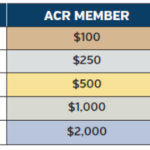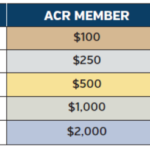People can support causes, committees, campaigns, etc. in infinite ways. Members of the ACR/ARHP can see their efforts magnified via an investment in the ACR’s political action committee, RheumPAC. Your contribution goes directly to help support rheumatology and rheumatologists around the country.
Proof of any group’s success can be seen in the satisfaction of its members. If you haven’t yet invested in RheumPAC, two members who believe in the committee’s work share their thoughts on why it’s important to invest.
Fotios Koumpouras, MD
In today’s political climate, we find that local communities and business groups must keep up with the pace and even outpace the ever-changing political agenda. This is particularly true in the medical industry, where rapidly changing political agendas, reimbursement laws and vacillating payer mixes make it difficult to understand what one individual can do to [effect] change and be successful as a practicing rheumatologist. We have seen how campaign support of elected officials by various lobbyists and political action groups affects government policies. To be heard, you need to get involved.
Being part of RheumPAC allows your voice to be magnified in unison with other rheumatologists. RheumPAC has facilitated change, such as MACRA flexibility, where CMS has agreed to add options to avoid penalties, and the passage of H.R. 5001 and S. 2822, allowing providers in the Medicare EHR Incentive Program to report to a 90-day reporting period in 2017 rather than a full calendar year. RheumPAC helped advocate for the successful defeat of CMS’s Part B demonstration project, which would have reduced reimbursement to providers for expensive infusion treatments, and for the increase in NIH funding in 2017. On the state level, we [helped] pass six biosimilar bills and four step therapy laws, stopped a coverage change proposed by a payer in North Carolina for steroid injections and got a down-coding decision reversed in the Palmetto MAC region.
Through support of RheumPAC, you can be assured that your investment will support legislation that improves the practice of rheumatology.
John McDougall, MD
Clinicians’ perspectives are critical to efforts made toward designing and reforming the U.S. healthcare system. Whether acting collectively to implement healthcare measures, or individually through direct patient care, clinicians can help both industry and government responsibly spend our limited healthcare dollars. RheumPAC, although representing a small subspecialty, has a big impact by helping focus, amplify and convey the important messages specific to rheumatology.
So much of what affects our patients—and our practice—comes as the direct result of federal and state policy. As a rheumatology fellow in training, I give to RheumPAC because I see the difference it makes. RheumPAC helps me get the attention of my elected representatives on a number of wide-ranging issues, from Medicare payment reform to transparency in drug pricing to state requirements for step therapy. Most importantly, RheumPAC’s nonpartisan approach helps us all focus on what matters most—the needs of our patients.

